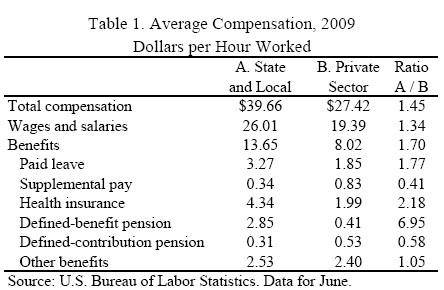We have a new dynamic developing across the country, especially in states that are in financial trouble like California, New Jersey, and Illinois. The working class citizens in the private sector are paying a hefty premium for the working class citizens in the public sector, who earn much more in total compensation. To better appreciate that premium, the U.S. Bureau of Labor Statistics reported that public sector compensation is 45% higher than private sector compensation. See chart below.

There is a growing resentment from the private sector producers who feel they are being taken for granted. It is not R vs. D. It is not rich vs. poor. It is becoming the public sector vs. the private sector. So why does the public sector worker get compensated so much better? Are they better workers? Are they more capable? Are they more deserving? How does one justify the existing public sector premium without being perceived as condescending? For the many who don’t get the guaranteed pay and benefits that others do, why should they be providing benefits they personally do not benefit from?
In case you missed it, Jimmy John Liautaud’s rant on the 1/19/11 “Penny for your Thoughts” show bashed public sector workers. The aftermath was more than halfway interesting. People were calling into talk shows suggesting that he should “pitch in to help just like the rest of us” and that people need to respect the number of public sector employees and the benefits they bring to the local economy. After listening to people in the community vent, what I suspected would happen in the next five to ten years may have already begun — worker vs. worker. One group of workers must now make more sacrifices while another group of workers receives guaranteed pay and lives in relative comfort. While Jimmy John is not your average worker, we are hearing the same bashing of public employees from the everyday workers who don’t enjoy those guaranteed benefits and aren’t happy to pay for “bloated pensions”.
While Illinois continues to dig a hole, New Jersey is working get out of their hole. The Garden State ranked dead last on the Tax Foundation’s State Business Tax Climate Index from 2007–2010 and finally got out of the gutter after electing Chris Christie as Governor. In that state a battle is being waged between the public sector special interest groups and the Governor. It was so bad that teachers were asked to pray for the death of Governor Christie.
Do we want to be more like New Jersey and follow them down that path? In that same Index, Illinois dropped from 23 to 36 after the income tax hike and business tax hike. As we do nothing to curb the cost of living and doing business in this state, we will likely drop further on this index.
So is that good or bad? If you think #50 New York ($14B deficit), #49 California ($17.2B deficit), and #48 New Jersey ($10.5B deficit) are shining examples of what our state should be, then ignore the Tax Climate Index.
I personally don’t care to see what happened in New Jersey happen in our state/community. A logical short-term solution with long-term results would be to align public and private sector pay and benefits. When the times are good, everyone should enjoy the rewards. When times are bad, we should all make sacrifices.
If one group of workers is protected at the expense of another group, resentment will continue to grow. The private sector currently works for the public sector. More and more moderates are suggesting that it should be the other way around. Personally, I think we should be working together to make our state the #1 best place to live and create jobs. That is never going to happen while one group of workers doesn’t respect another class of workers. That is never going to happen while the powers that be in this state are standing tall for special interest groups and looking down on the other producers in this state. If this continues, we should not be surprised when people seek out places where they are more welcome.








